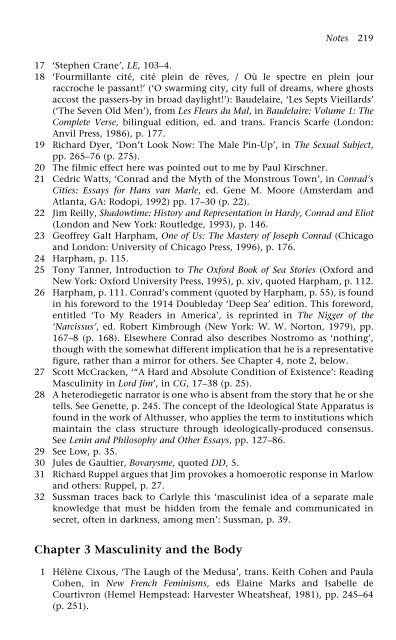Conrad and Masculinity
Conrad and Masculinity
Conrad and Masculinity
You also want an ePaper? Increase the reach of your titles
YUMPU automatically turns print PDFs into web optimized ePapers that Google loves.
17 ‘Stephen Crane’, LE, 103–4.<br />
18 ‘Fourmillante cité, cité plein de rêves, / Où le spectre en plein jour<br />
raccroche le passant!’ (‘O swarming city, city full of dreams, where ghosts<br />
accost the passers-by in broad daylight!’): Baudelaire, ‘Les Septs Vieillards’<br />
(‘The Seven Old Men’), from Les Fleurs du Mal, in Baudelaire: Volume 1: The<br />
Complete Verse, bilingual edition, ed. <strong>and</strong> trans. Francis Scarfe (London:<br />
Anvil Press, 1986), p. 177.<br />
19 Richard Dyer, ‘Don’t Look Now: The Male Pin-Up’, in The Sexual Subject,<br />
pp. 265–76 (p. 275).<br />
20 The filmic effect here was pointed out to me by Paul Kirschner.<br />
21 Cedric Watts, ‘<strong>Conrad</strong> <strong>and</strong> the Myth of the Monstrous Town’, in <strong>Conrad</strong>’s<br />
Cities: Essays for Hans van Marle, ed. Gene M. Moore (Amsterdam <strong>and</strong><br />
Atlanta, GA: Rodopi, 1992) pp. 17–30 (p. 22).<br />
22 Jim Reilly, Shadowtime: History <strong>and</strong> Representation in Hardy, <strong>Conrad</strong> <strong>and</strong> Eliot<br />
(London <strong>and</strong> New York: Routledge, 1993), p. 146.<br />
23 Geoffrey Galt Harpham, One of Us: The Mastery of Joseph <strong>Conrad</strong> (Chicago<br />
<strong>and</strong> London: University of Chicago Press, 1996), p. 176.<br />
24 Harpham, p. 115.<br />
25 Tony Tanner, Introduction to The Oxford Book of Sea Stories (Oxford <strong>and</strong><br />
New York: Oxford University Press, 1995), p. xiv, quoted Harpham, p. 112.<br />
26 Harpham, p. 111. <strong>Conrad</strong>’s comment (quoted by Harpham, p. 55), is found<br />
in his foreword to the 1914 Doubleday ‘Deep Sea’ edition. This foreword,<br />
entitled ‘To My Readers in America’, is reprinted in The Nigger of the<br />
‘Narcissus’, ed. Robert Kimbrough (New York: W. W. Norton, 1979), pp.<br />
167–8 (p. 168). Elsewhere <strong>Conrad</strong> also describes Nostromo as ‘nothing’,<br />
though with the somewhat different implication that he is a representative<br />
figure, rather than a mirror for others. See Chapter 4, note 2, below.<br />
27 Scott McCracken, ‘“A Hard <strong>and</strong> Absolute Condition of Existence’: Reading<br />
<strong>Masculinity</strong> in Lord Jim’, in CG, 17–38 (p. 25).<br />
28 A heterodiegetic narrator is one who is absent from the story that he or she<br />
tells. See Genette, p. 245. The concept of the Ideological State Apparatus is<br />
found in the work of Althusser, who applies the term to institutions which<br />
maintain the class structure through ideologically-produced consensus.<br />
See Lenin <strong>and</strong> Philosophy <strong>and</strong> Other Essays, pp. 127–86.<br />
29 See Low, p. 35.<br />
30 Jules de Gaultier, Bovarysme, quoted DD, 5.<br />
31 Richard Ruppel argues that Jim provokes a homoerotic response in Marlow<br />
<strong>and</strong> others: Ruppel, p. 27.<br />
32 Sussman traces back to Carlyle this ‘masculinist idea of a separate male<br />
knowledge that must be hidden from the female <strong>and</strong> communicated in<br />
secret, often in darkness, among men’: Sussman, p. 39.<br />
Chapter 3 <strong>Masculinity</strong> <strong>and</strong> the Body<br />
Notes 219<br />
1 Hélène Cixous, ‘The Laugh of the Medusa’, trans. Keith Cohen <strong>and</strong> Paula<br />
Cohen, in New French Feminisms, eds Elaine Marks <strong>and</strong> Isabelle de<br />
Courtivron (Hemel Hempstead: Harvester Wheatsheaf, 1981), pp. 245–64<br />
(p. 251).




